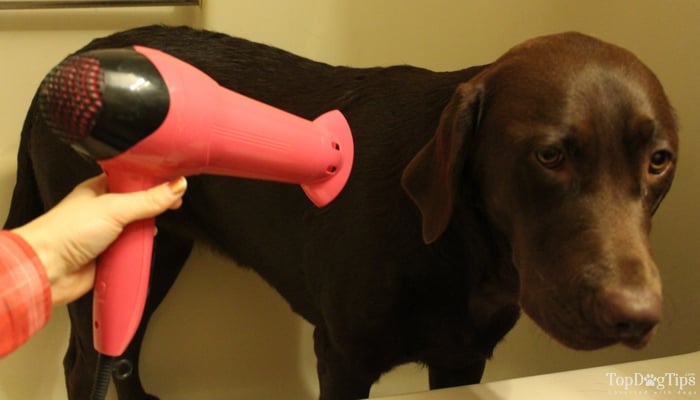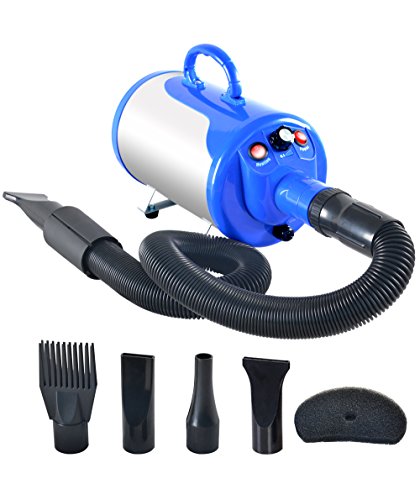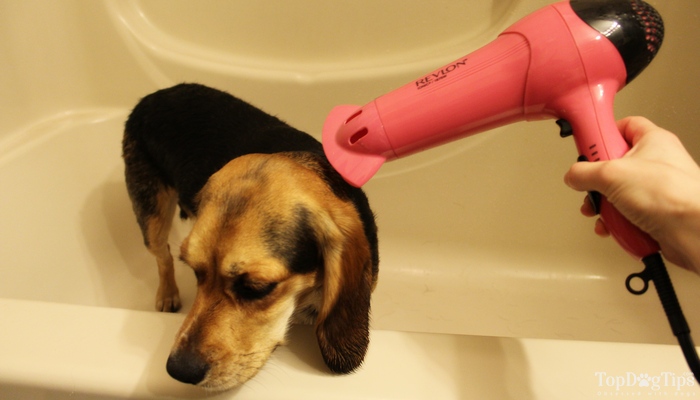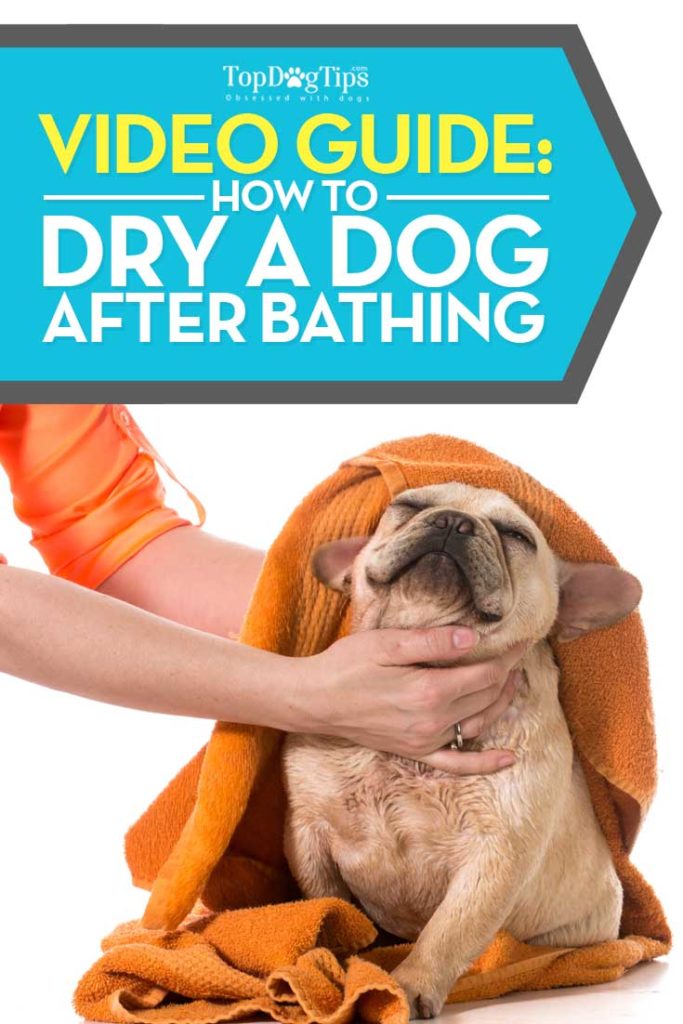If you bathe a dog at home, you're going to need to know how to dry a dog as well. It may sound like common sense to you, but there is more than one way to accomplish this task. It can be daunting, especially if your pup has long or thick fur. Nevertheless, you must always dry your pet.
Table of Contents
There are two main ways to dry a dog: with a dog towel or a pet dryer (or hairdryer). I suggest starting with a towel and gradually introducing your pet to a pet dryer or hairdryer. Most dogs will be timid of the noise that pet hair dryers produce, thereby making your grooming session and drying process harder.
How to Dry a Dog with a Dog Towel
I know what you're thinking: “I know how to towel dry a dog and how difficult can that be, anyway!” Unfortunately, it really is not always as simple as you may think, especially for dogs with longer and/or thicker coats, or the fussy ones.
1. Start at the Beginning
The beginning means preparation: you need to select the right towel for dogs.
I recommend a microfiber towel, as they can absorb a lot of water and won't drip on your floors. Absorption is the main factor when it comes to drying dogs after a bath, because regular “human” towels will not work for many breeds (or you'll need far, far more towels).
Some of my recommended best dog towels you can try are below:
| Preview | Product | Rating | |
|---|---|---|---|

|
Dog Gone Smart Shammy Dog Towels For Drying Dogs -... | 1,637 Reviews | Check Price |

|
Wooflinen Microfiber Pet Bath Towel, 2-Pack,... | 987 Reviews | Check Price |

|
My Doggy Place Dog Towel - Super Absorbent... | 495 Reviews | Check Price |
2. Front to Back, Top to Bottom
When towel drying your dog, you want to start strictly with the dog's head and work your way toward the dog's back end. Don't mess about.
You should also work from top to bottom, meaning you should start drying your dog's back and work your way down toward your dog's belly and then legs.
3. Don't Forget Other Parts
You should get any water into your dog's ears, but some of it can get onto the surface. So, be sure you dry over and slightly inside your dog's ears, because water in dog's ears can lead to ear infections.
You must also dry each paw. A lot of water accumulates underneath your pet's paws as they're standing in the bath tub. If you don't dry the dog's paws, you'll have wet paw tracks all through your home.
Note: If you have a large breed dog, especially one with a thick or double coat, you may need more than one towel. When the first becomes saturated, you'll need to switch to another towel or your efforts will be in vain. Towels can only hold so much water.
How to Dry a Dog with a Hairdryer
 When learning how to dry a dog, towel isn't the only way – you have another decent option. Towel drying a dog is more work, but it's actually quicker than using a pet dryer (or hairdryer). But if you're not pressed for time, drying your dog with a pet dryer/hairdryer is a much easier option for you.
When learning how to dry a dog, towel isn't the only way – you have another decent option. Towel drying a dog is more work, but it's actually quicker than using a pet dryer (or hairdryer). But if you're not pressed for time, drying your dog with a pet dryer/hairdryer is a much easier option for you.
1. Safety First
When using a “human” hairdryer to blow dry a dog, you must be particularly careful, both in the way you're using it, and the type of hairdryer you're using. You should set the hairdryer to the lowest heat setting (coolest temperature) and also keep it at least a a couple of inches away from the dog.
In my video above and this guide, I'm showing how to dry a dog using a hairdryer (blow drying a dog) because most people will already have a hairdryer at home. Dog-specific pet dryers, while better, will need to be bought and can be expensive.
However, drying a dog with a pet dryer is much safer, easier and far quicker (and they blow room temperature), particularly for breeds with long and thick hair. Here are my tips on how to pick the safest and best pet dryer for your dog, and how to use them properly.
Some of the best dog dryers that are affordable and safe are below:
| Preview | Product | Rating | |
|---|---|---|---|

|
SHELANDY Groomer Partner Pet Hair Force Dryer Dog... | 11,002 Reviews | Check Price |

|
PETNF Dog Dryer for Pet Grooming, Dog Hair Dryer... | 2,516 Reviews | Check Price |

|
Dog Dryer, IFurffy Pet Grooming Dryer with High... | 73 Reviews | Check Price |
2. Get Your Dog Used to the Dryer
Unlike with pet towels, keep in mind that your dog will likely be afraid of the noise of the dryer at first, so you'll need to get your pup acclimated to the pet dryer very gradually.
Start by turning it on and let the dog get used to the sound in a neutral area (i.e. not in the grooming area, like bathroom). Do not rush this part and note how your pooch reacts.
Once the dog is used to the noise of the hairdryer in the living room (or elsewhere), you can bring your pup into bathroom (or wherever you groom the dog). Now, let the dog listen to the sound of dryer in here. This way the dog will associate the sound of the hairdryer with the environment.
I share more more tips on keeping dogs calm during grooming in this guide.
3. Dry the Dog Like You Dry Your Hair
Now that your dog is comfortable with the blow dryer noise, you are probably ready to dry your pup's coat. Take a second and think of how you dry your own hair. You move the dryer back and forth quickly so your scalp doesn't get burned, right?
Do the same thing for your pet:
- Place the hairdryer's hose 2 inches away from the dog's skin (or right up against the dog's skin if using a pet dryer).
- Do the standard short up-and-down and side-to-side strokes you normally do on your own hair.
- You should focus on drying from the dog's skin out while checking how the progress is moving.
Remember that your dog cannot tell you when the dryer feels too hot on their skin, so you need to continuously move it around to avoid burning the dog (remember the 2 inch rule mentioned above). Keep checking on your dog's reaction as well.
As you can see in my video, the blow dryer I'm using has a cool air setting, which is what I use when I'm drying my dogs. It's important to buy a hairdryer that is totally safe for your pooch, but that's also effective at drying dog's coat. Not all of them are, which is why pet dryers are better.
READ NEXT: How to Bathe a Dog 101
Disclosure: We may earn affiliate commissions at no cost to you from the links on this page. This did not affect our assessment of products. Read more here and find full disclosure here.















